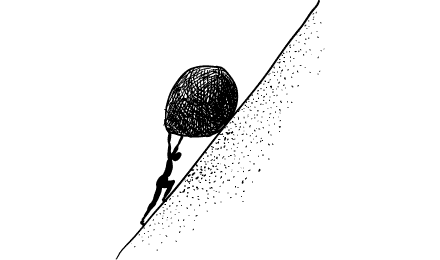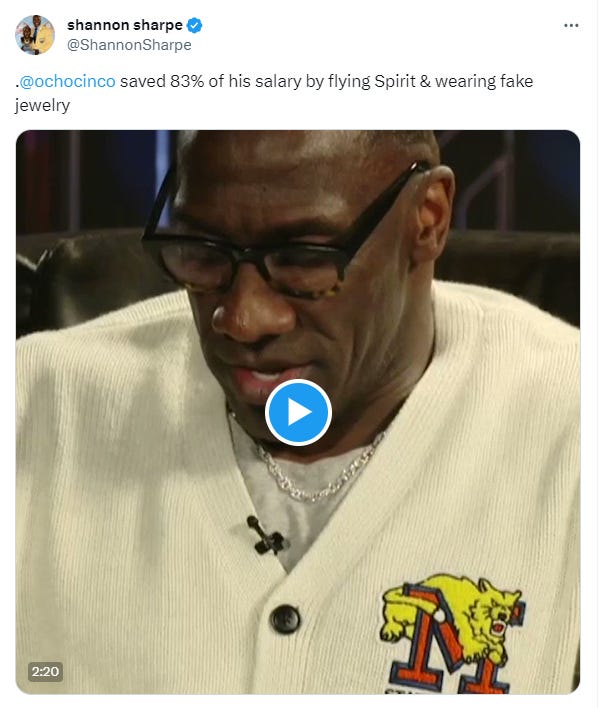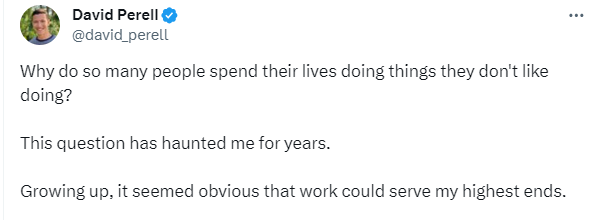🤯Unknown Unknowns #115 - Don’t Kill Time, Make Time
The mass of men lead lives of quiet desperation. - Thoreau
In Greek mythology, Sisyphus was punished to endlessly roll a stone up a hill, only for it to roll back to the bottom when he reached the top. The punishment was in the futility.
I treated my life like Sisyphus’ endless task. Every day, every week, every year was to accomplish a set of tasks, only for a new task list to appear the next day/week/year.
I would relieve my dissatisfaction with vacations, hobbies, activities.
I imagine that Sisyphus distracted himself as much as possible.
But this is killing time.
Instead of tasks to be done, what if we did things we wanted to do? What if we carved out time to do the things we want to do?
What if we make time?
There’s a fine distinction between killing time and making time. You could say that watching a YouTube video is killing time.
But it could also be making time.
The difference is in your motivation. Are you watching with autoplay on, letting the algo shove videos through your eyes like a gavage? Or are you trying to master a skill and looking for an expert to demonstrate a particular nuance? I’m not saying there needs to be an explicit point to everything you do, there’s definitely nuance here. Life is not about being as productive as possible. And who knows what can spring out of seemingly useless activities? While Making Time might be hard to identify, you can try to avoid Killing Time as much as possible1.
If you’re Sisyphus and you’re condemned to endlessly execute a fruitless task, feel free to kill time. Anything to make eternity pass faster.
But if you have the option, make time.
If you’re familiar with Camus’ Myth of Sisyphus, I would like to hear your thoughts on how this essay differs from Camus’ interpretation.
Discoveries:
1️⃣ A trophy job is a job with more status than substance. But Anu argues that trophy jobs are not inherently bad.
2️⃣ For me, working in a company meant a life of killing time. My focus and self-worth became wrapped in doing well at the company. I killed time when outside the company.
A company man is someone who feels that he has something huge to lose if he doesn’t behave as a company man –that is, he has skin in the game
If the company man is, sort of, gone, he has been replaced by the companies person, thanks to both an expansion of the gender and a generalization of the function. For the person is no longer owned by a company but by something worse: the idea that he needs to be employable.
A companies person is someone who feels that he has something huge to lose if he loses his employability –that is, he or she have skin in the game
The employable person is embedded in an industry, with fear of upsetting not just their employer, but other potential employers.
🔗 How To Legally Own Another Person
3️⃣ One way to maintain your identity is to follow the example of Chad Johnson, an NFL player from about fifteen years ago. He wore fake jewelry and flew Spirit Airlines to save money. If you need to have an image that conflicts with your values, spend the least amount of time and effort to do so.
🔗 https://twitter.com/ShannonSharpe/status/1620223077702586370
4️⃣
🔗 https://twitter.com/david_perell/status/1704528733237923961
5️⃣ If you’ve ever used a template, you’ve probably come across a bunch of text starting with “Lorem ipsum.” It’s used as a placeholder so you can see what the font and positioning of text look like. It’s actually not nonsense words, but a speech by Cicero (That’s one time this week you’ve thought of the Roman Empire!)
But I must explain to you how all this mistaken idea of reprobating pleasure and extolling pain arose. To do so, I will give you a complete account of the system, and expound the actual teachings of the great explorer of the truth, the master-builder of human happiness. No one rejects, dislikes or avoids pleasure itself, because it is pleasure, but because those who do not know how to pursue pleasure rationally encounter consequences that are extremely painful. Nor again is there anyone who loves or pursues or desires to obtain pain of itself, because it is pain, but because occasionally circumstances occur in which toil and pain can procure him some great pleasure. To take a trivial example, which of us ever undertakes laborious physical exercise, except to obtain some advantage from it? But who has any right to find fault with a man who chooses to enjoy a pleasure that has no annoying consequences, or one who avoids a pain that produces no resultant pleasure?
🔗 De Finibus Bonorum et Malorum (On the Ends of Good and Evil)
Quotes of the Week:
“Put bluntly, too many of us spend years, even decades, in pursuit of someone else’s plan for our one precious life.” - Chase Jarvis
“Our lives are not dress rehearsals in which we plan and are tested in anticipation of the real show to come. This is it...” - Sean Carroll
You can find more of my writing at chr.iswong.com.
Questions, suggestions, complaints? Email me at [email protected].
Feedback welcome.
If you enjoyed this newsletter, please share it with a friend or two. And feel free to send anything you find interesting to me!
Leaving you in peace,
Chris
One way to pursue Making Time is by following your curiosity. Tom Morgan is a huge proponent of this approach.




Great food for thought, Chris!
I found that working in a company can also make time if what you're building is aligned with your views, compensated well, and can grow constantly.
Although I've been self-employed for seven years, sometimes I think about joining a company that is aligned with my views. What I miss about regular employment sometimes is the growth part because I rarely work with more experienced engineers.
Many who now enjoy self-employment as writers, SaaS founders, or solopreneurs once had mentors or jobs that taught them a lot and can write about that today.